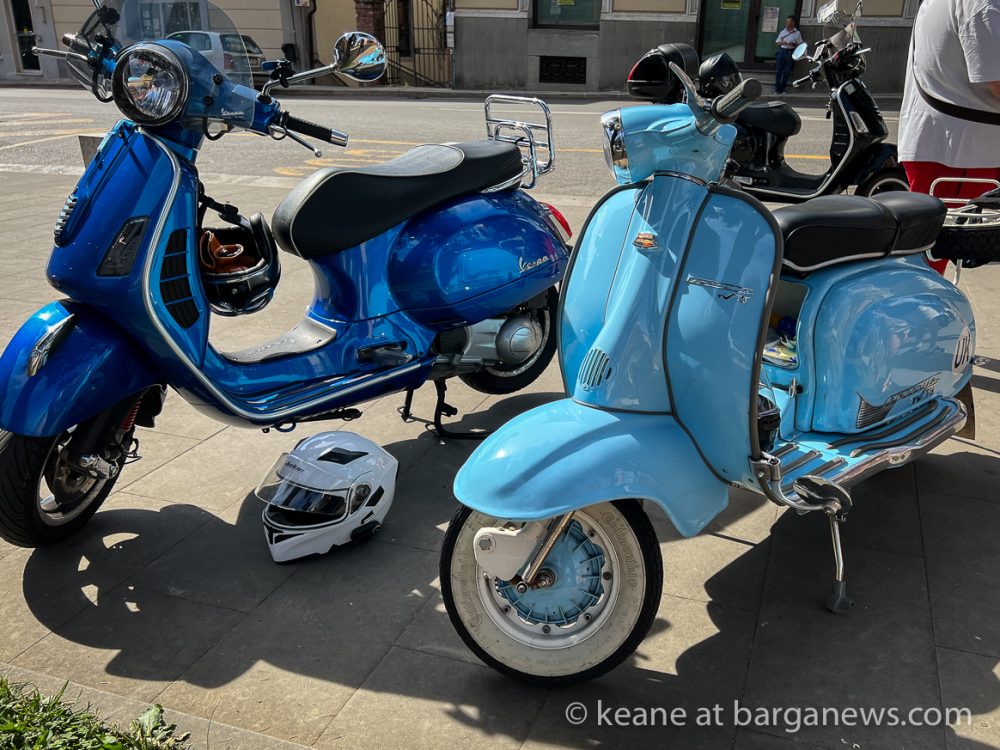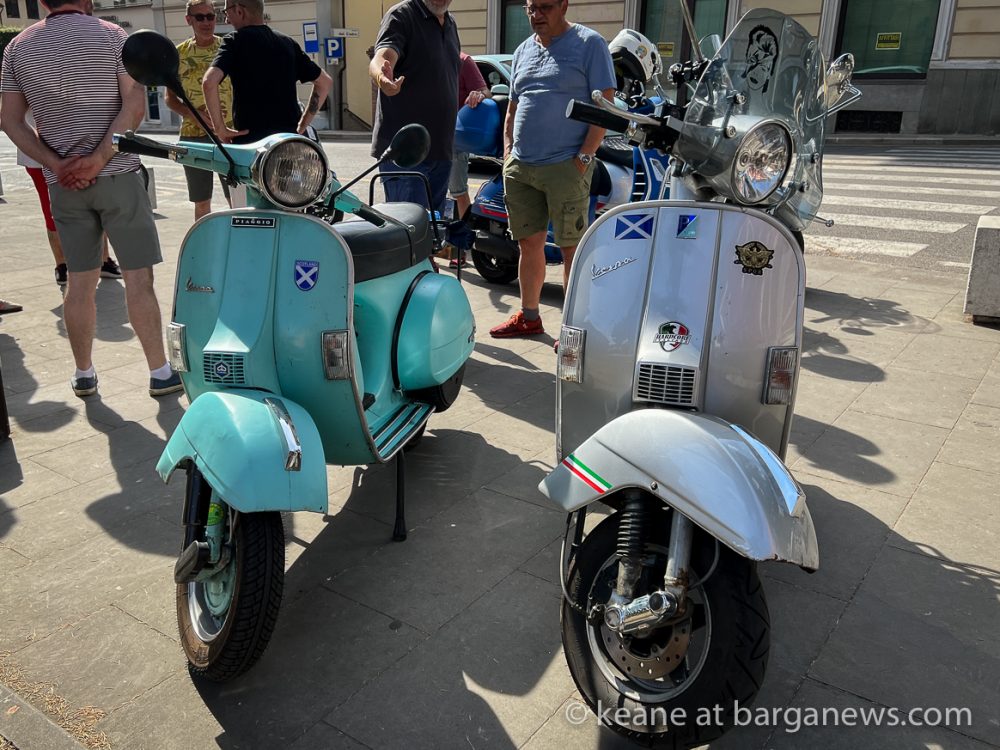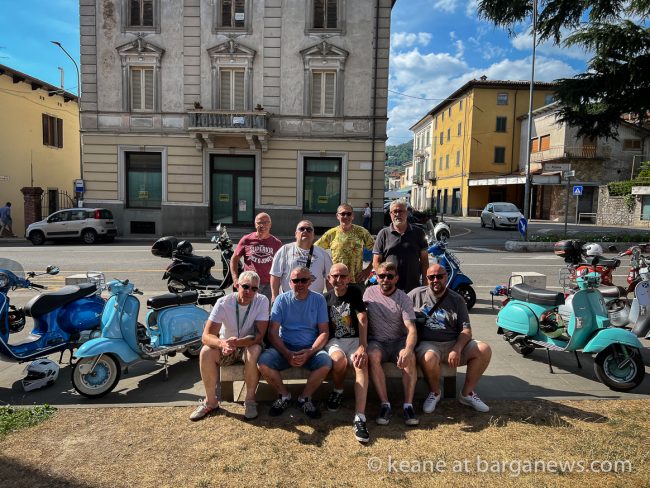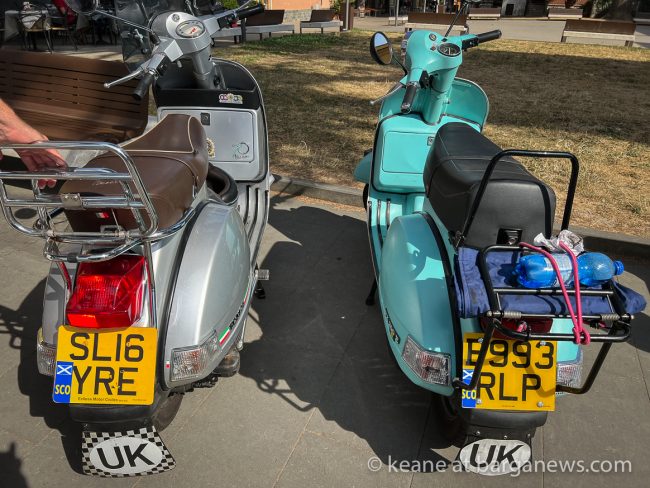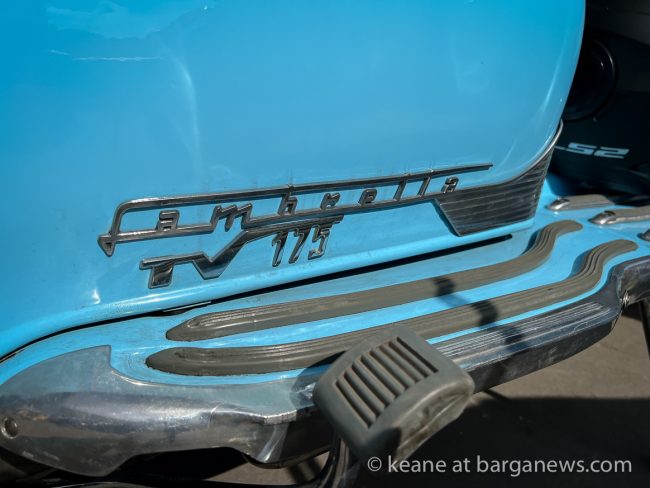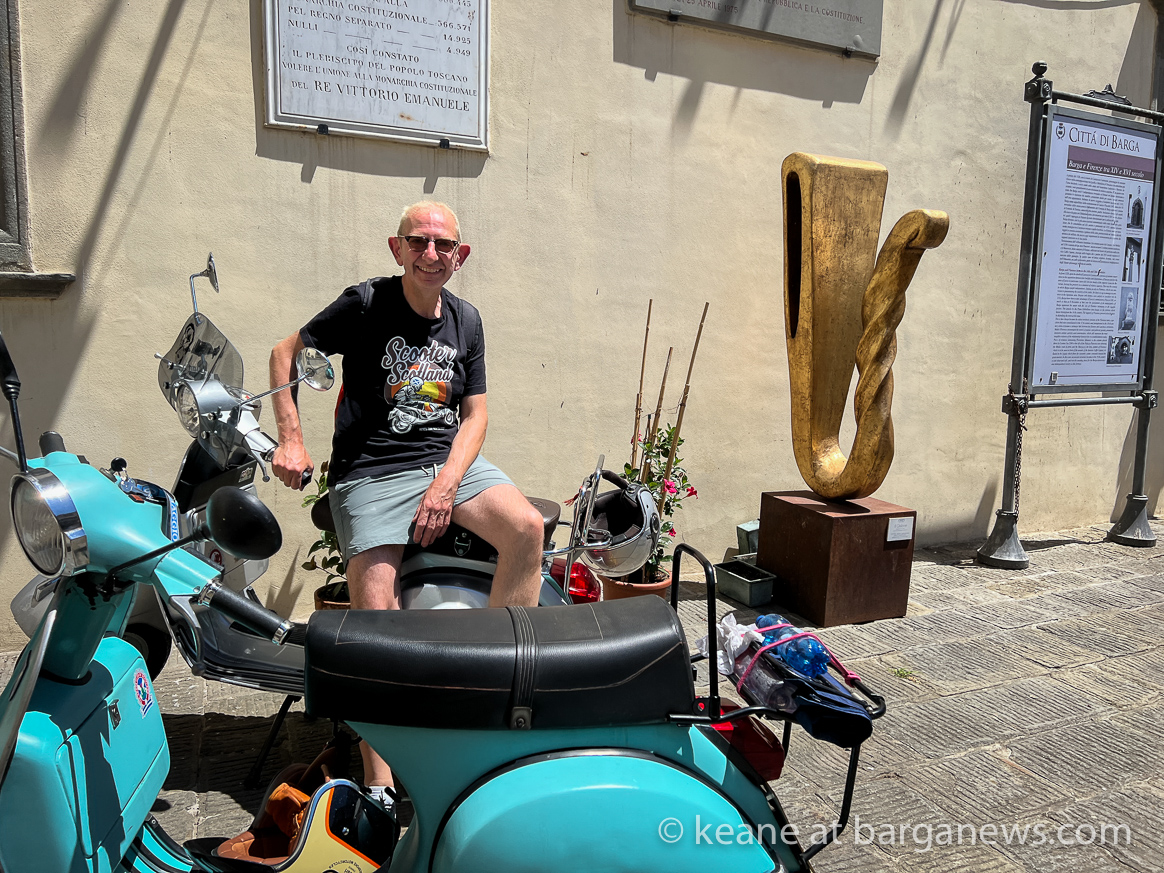Alongside four friends, Renato Luchessi realised a lifelong ambition by travelling from Scotland to Barga – the ‘most Scottish town in Italy’ – by riding on his Vespa scooter – a long article on the National newspaper in Scotland By Rebecca Anne Hughes. We reported on this event here
BARGA is a town in Tuscany of ochre-coloured houses with terracotta roofs and a Romanesque church shaded by cypress trees.
But as you wander through the narrow streets, you’ll spot Scottish flags fluttering outside windows, waiters with Glaswegian accents, a grocery shop selling Irn-Bru and the odd kilt-wearing resident.
The Tuscan community is dubbed “the most Scottish town in Italy” and earned its moniker after swathes of the population emigrated to Scotland in the early 20th century in search of work.
In more recent decades, a reverse migration has occurred, with Scots returning to live in the village of their ancestors, drawn by a desire to reconnect with their heritage.
Renato Lucchesi, owner of Hair on the Edge hairdressing salon in Edinburgh, is the descendent of two Barga emigres. His grandparents, nonno and nonna Piacentini, were from Barga while those on his father’s side, nonno and nonna Lucchesi, were from Cardoso, a village 15 minutes away by car.
Over 100 years ago, both sets of grandparents moved to Glasgow, the second city of the Empire under the reign of Queen Victoria, in search of better economic opportunities (and most of the family is still in Scotland).
At first, Renato’s grandfather worked on the railways but later, like many Italian migrants, he opened a chain of fish and chip and homemade ice cream shops in Galston under the name Principal Cafe.
“I remember as a wee boy in the 60s when the mods would gather and listen to the jukebox,” Renato says.
Singer Paolo Nutini is another of the many Scots with a Barga connection; his great-grandfather moved over from Italy to Scotland and established the family fish and chip shop in Paisley (and Nutini’s uncle reportedly runs the Celtic pub back in Barga).
Since Renato was a child, he has been returning to Barga each summer for two or three weeks, where there is still a family house from his mother’s side. But last year, at the age of 61, he decided to make the journey considerably more adventurous and realise the aspiration of a lifetime.
“Since I was a kid, I’ve always dreamed of riding a scooter from Scotland to Italy,” he says. Renato is a die-hard fan of Vespas, Italian scooters made since 1946, and attends rallies and takes road trips around the UK on his beloved two-wheeler.
Renato set about making plans to get to Barga by Vespa in 2021. He was supposed to make the journey to celebrate his 60th birthday but the trip was postponed by a year because of Covid. So on June 25, 2022, Renato and four friends, Gary McCaw, Raymond Douglas, Eddie Gallagher and Steven Wilson, set off to travel to the Tuscan town on their Italian scooters.
On a 125cc PX Vespa, Renato rode more than a thousand miles through five countries – the Netherlands, Belgium, France, Switzerland and Italy – and across the Alps to reach Barga.
Naturally, the journey was an ambitious undertaking. The previous year, the group had ridden Scotland’s North Coast 500 route after Covid thwarted their Italy plans. En route, they had been forced to stop as many as three times a day to repair their elderly vehicles.
“We were laid up in lay bays all the way around the route for hours at a time,” Renato says. “Some of the scooters we were driving are 50 years old, so I guess it was inevitable.”
As a consequence, they chose to bring a support van with various spare parts and tools for the journey to Italy. Naturally, they didn’t end up having any breakdowns but the vehicle served to carry luggage, equipment and extra fuel, the latter of which was also a major concern.
“My Vespa has a small tank so every hour or hour and a half I had to refuel,” recalls Renato.
Although their senior scooters weathered the journey admirably, mishaps weren’t completely avoided. Helmets were forgotten on the ferry from Newcastle over to Holland and new ones had to be bought, and a tank of fuel toppled over in the van and leaked over the group’s bags and clothes.
Navigation wasn’t always smooth sailing.
“It was a nightmare trying to get out of Geneva, and we also got lost in Genova,” Renato says. “We decided to come off the motorway to get petrol in the centre and we couldn’t get out, we were going round in circles and it was rush hour. Geneva and Genova were two of the low points and wasted a lot of time.”
Vintage Vespas are not famed for their comfort and six days of riding took their toll on the group.
“It was physically and mentally exhausting doing six or seven hours every day on a scooter that wasn’t really built for this,” says Renato. “Some of the guys had sore backs, shoulders and definitely backsides. Everyone had an issue. By the end of two hours, your backs are aching.”
Eddie rode a Vespa GTS, Gary had a Vespa PX from 1985 and Raymond travelled on a Lambretta from 1960 (Steve drove the support van).
They had optimistically brought tents, but never used them. “After being on the scooters all day, all we wanted at the end of each day was a soft bed and a hot shower,” Renato says. “There’s no way we were going to stay in a tent.”
Aches and pains were quickly forgotten, however, in the face of their stunning surroundings. Most of the way, they followed the equivalent of A roads for more interesting scenery.
For Renato, one of the highlights of the trip was crossing the Alps over the Mont Cenis pass, which reaches a height of 2085 metres. His Vespa can just about hit 50 mph on flat terrain, so the steep climb was an act of faith in his scooter.
“It was just incredible, and crossing the border into Italy was a fantastic feeling,” he says.
After six days, the group faced their final challenge: a pitch-black serpentine road leading up the hill to Barga.
“The roads are very windy and narrow so it was terrifying, especially for the other boys who had never done that road before,” says Renato.
Nevertheless, on the evening of July 1 they rode triumphantly (or as they wrote in the local paper in the following days, “exhausted but full of joy”) into the town on scooters emblazoned with Scottish flag stickers and badges. They were greeted like a group of returning prodigal sons by the local Vespa Club, which numbers over 200-strong during rallies.
The group stayed five days in Barga, enjoying the town’s renowned Scottish-Italian hospitality. Hosted by the Vespa Club Barga, they went sightseeing around town, saw the Vespa clubhouse, joined a “raduno” (rally) with other riders and shared convivial dinners.
One day, they rode up into the mountains for a big local festival called the Sagra di Pegnana.
“We had pasta and lots of grilled meat, all washed down with copious amounts of local Chianti,” says Renato.
Barga in summer almost seems like one continual festival. There is a raucous jazz festival that fills the streets with fervent musicians and swaying crowds as well as a literary festival, street food event, outdoor cinema and beer festival.
The most anticipated event, however, is the unabashedly Scottish fish and chips or “pesce e patate” festival held annually in August. It takes place in the Johnny Moscardini stadium, named after the only Scottish-born male footballer to play for Italy. From the August 4-17 this year, the stadium was filled with the unmistakable smell of fried battered fish more commonly associated with a Saturday night takeout.
The event draws plenty of overseas visitors, particularly Scots like Renato with ancestors from the Italian town. The festival came about as part of an effort to pay tribute to the deep connections forged between Italy and Scotland and to honour the Scottish-Italian emigrants returning for the summer.
It was also a way to let those who had never left the Tuscan town sample the iconic dish.
What made the fish particularly distinctive from the Italian way of cooking was the use of deep-fat-fryers, a novel gadget for the Barghigiani, as the town’s residents are known.
During the first few editions, the emigrants passed on the new technology and their technique of fish frying to festival volunteers and fryers were sent from Scotland for the event.
Renato has been to the festival several times. “I love it,” he says. “You’re sitting outdoors with your bottle of Chianti, eating fish and chips!”
Come September, the town pays another tribute to the country of its emigres. Drifting across the soft hills covered in russet-leafed vines is the haunting sound of bagpipes as Barga celebrates the Settimana Scozzese, or Scottish Week.
Tartan-adorned stands sell shortbread, Irn-Bru and Tennent’s lager, Highland dancers take to the piazze and troops of kilted bagpipers parade the streets in a stirring display of Scottish pride.
In September, temperatures can still hit 30 degrees Celsius, which has disrupted proceedings some years given the heavy traditional dress of the pipers.
“I remember once they had a small Tattoo in the town square,” Renato recalls. “They were due to start at 7pm but it was still sweltering so they couldn’t start until after midnight when it eventually cooled down ever so slightly.”
These festivals are joyous, outward expressions of a cherished cross-cultural connection that is a powerful reminder of harder times, determination in the face of hardship, being a foreigner in a strange country, and the hard slog to ensure a better life for future generations.
“My grandfather worked 12-hour days, six or six and a half days a week, to secure a better future for us,” says Renato.
Links between the two countries continue to be forged and strengthened.
“The Vespa Club Barga were so warm and welcoming,” says Renato, “and anytime they come to Edinburgh we’ll be ready to show the same hospitality to them.”
That said, it’s more likely Renato will be back on his scooter and heading to Barga first. “You learn an awful lot from doing the journey once so we’ll be much better prepared for next time,” he says. “I certainly will do it again but this time I’ll take three weeks or a month so I have more time to stop and admire views and do sightseeing.”
He’s also set his sights on a more ambitious trip. “When I retire in a couple of years time I’m going to take a scooter down the whole of Italy,” he says.
“My dream is to take three months and travel the length and breadth of the country.”



